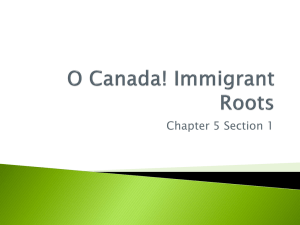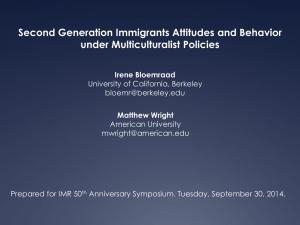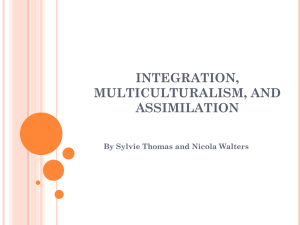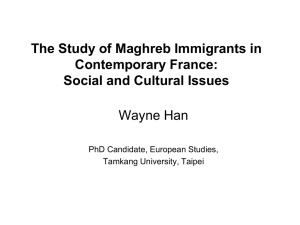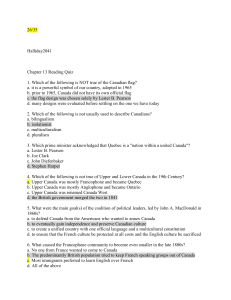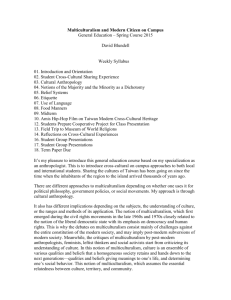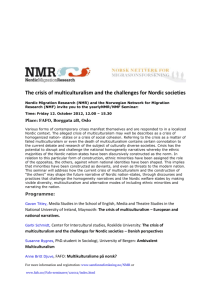Multiculturalism Definition: Multiculturalism is an “orientation” to
advertisement
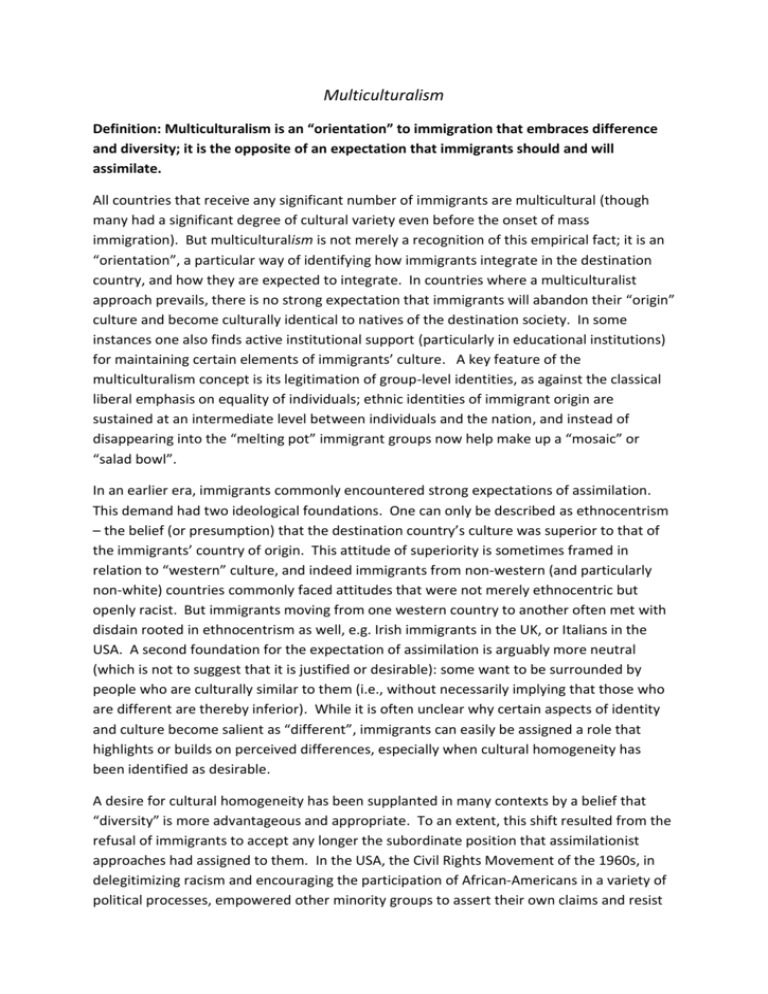
Multiculturalism Definition: Multiculturalism is an “orientation” to immigration that embraces difference and diversity; it is the opposite of an expectation that immigrants should and will assimilate. All countries that receive any significant number of immigrants are multicultural (though many had a significant degree of cultural variety even before the onset of mass immigration). But multiculturalism is not merely a recognition of this empirical fact; it is an “orientation”, a particular way of identifying how immigrants integrate in the destination country, and how they are expected to integrate. In countries where a multiculturalist approach prevails, there is no strong expectation that immigrants will abandon their “origin” culture and become culturally identical to natives of the destination society. In some instances one also finds active institutional support (particularly in educational institutions) for maintaining certain elements of immigrants’ culture. A key feature of the multiculturalism concept is its legitimation of group-level identities, as against the classical liberal emphasis on equality of individuals; ethnic identities of immigrant origin are sustained at an intermediate level between individuals and the nation, and instead of disappearing into the “melting pot” immigrant groups now help make up a “mosaic” or “salad bowl”. In an earlier era, immigrants commonly encountered strong expectations of assimilation. This demand had two ideological foundations. One can only be described as ethnocentrism – the belief (or presumption) that the destination country’s culture was superior to that of the immigrants’ country of origin. This attitude of superiority is sometimes framed in relation to “western” culture, and indeed immigrants from non-western (and particularly non-white) countries commonly faced attitudes that were not merely ethnocentric but openly racist. But immigrants moving from one western country to another often met with disdain rooted in ethnocentrism as well, e.g. Irish immigrants in the UK, or Italians in the USA. A second foundation for the expectation of assimilation is arguably more neutral (which is not to suggest that it is justified or desirable): some want to be surrounded by people who are culturally similar to them (i.e., without necessarily implying that those who are different are thereby inferior). While it is often unclear why certain aspects of identity and culture become salient as “different”, immigrants can easily be assigned a role that highlights or builds on perceived differences, especially when cultural homogeneity has been identified as desirable. A desire for cultural homogeneity has been supplanted in many contexts by a belief that “diversity” is more advantageous and appropriate. To an extent, this shift resulted from the refusal of immigrants to accept any longer the subordinate position that assimilationist approaches had assigned to them. In the USA, the Civil Rights Movement of the 1960s, in delegitimizing racism and encouraging the participation of African-Americans in a variety of political processes, empowered other minority groups to assert their own claims and resist demands for assimilation – particularly when those demands appeared to be rooted in ethnocentrism. Immigrant/minority-group assertiveness and discourses of anti-racism emerged in other countries as well, and in some countries e.g. Canada and the Australia (and perhaps the UK, though to a lesser extent) multiculturalism was embraced at the highest levels of government, as “official policy” (Kivisto 2002). Contemporary multiculturalism thus finds expression in a set of attitudes and policies designed to celebrate and foster diversity, and the differences between immigrants and natives are often celebrated rather than reviled. Kivisto (2012) identifies five types of claims that policies address: exemption, accommodation, preservation, redress and inclusion. Policies commonly pursued under these logics include bilingual education for children especially in early years; efforts to prevent harassment and stereotyping in the media, employment, schools and public services; and affirmative action to increase representation of immigrant groups in political and educational institutions as well as some employment sectors (Kymlicka 2001). In the UK multiculturalism has extended to the creation of statesupported minority religious schools, building on the precedent of Christian and Jewish schools to establish Muslim and Hindu schools as well. There are also measures intended to grant public recognition, as when political elites participate conspicuously in holiday celebrations of minority groups, e.g. Diwali, and certain regulations are sometimes varied for minority groups, in relation to dress codes or weekly/holiday schedules. Sometimes multiculturalism is presented as a radical departure from past practices, and some observers (as well as some activists and politicians) frame multiculturalism as a path towards “separatism” and national disintegration. A lament by Schlesinger is typical of this mode of critique: “The cult of ethnicity exaggerates differences, intensifies resentments and antagonisms, drives ever deeper the awful wedges between races and nationalities” (1992: 102). In giving salience to differences, multiculturalism is said to undermine a shared American identity – perhaps endangering prospects for democratic governance (if not portending schism or secession, as once seemed to be possible for Canada). Some commentators in Europe worry particularly about Muslim immigrants, who are said to be insufficiently committed to democratic values while harbouring “dual loyalties” (with Islam predominant as a “hyper-identity”); insofar as European countries have failed to insist on assimilation to “European values”, Caldwell asserts that “multiculturalism became almost … a self-directed xenophobia” (2009: 86) that might facilitate Muslim ascendancy in Europe. Kymlicka (e.g. 2001) argues these worries are misplaced, and that portrayals of multiculturalism as separatism are a misrepresentation of what multiculturalism advocates want and of what actually takes place. Multiculturalism is best understood as a way of promoting integration, on “fairer terms”; it is thus the opposite of separatism. Measures such as bilingual education and affirmative action seek to facilitate immigrants’ participation in core social institutions, rather than to exclude them – in recognition of the likelihood that stringent assimilationist demands can result in marginalization rather than inclusion. Multiculturalist policies do not replace or challenge the core institutions and policies that provide the foundation for integration, and they fall well short of meeting the conditions that would enable “minority nationalism”. Tariq Modood (2005) makes similar arguments about Europe, where Muslims in the UK, for example, seek to be “British Muslims” while working for a redefinition of British identity that can transcend its historical white Christian English core to embrace Muslims as well. The “separatism” critique comes primarily from the political right – but there is a similar critique from the political left, where some observers are uncomfortable with the emphasis given to identity/culture as against other bases of solidarity. Multiculturalist discourses, which typically self-identify as “progressive”, address (and perhaps reinforce) a need for “recognition”, which in the contemporary period amounts to validation of “difference” in the public sphere (Taylor 1992). In older progressive (i.e., leftist) traditions, the main goal is redistribution of economic and political power – but man does not live by bread alone, people also want dignity. Some in the “old left” worry that the demand for recognition results in a fragmentation of class solidarity, undermining prospects for addressing the economic deprivation of immigrants and minority groups (Gitlin 1995, Barry 2001). A similar argument is constructed in relation to gender: Okin (1999) finds a significant tension between multiculturalism and the liberal feminism that has brought impressive gains to women in many western countries. That tension highlights the question: who gets to define the culture of particular groups and speak on their behalf? When immigrants come from strongly patriarchal societies, multiculturalist integration in destination countries might (Okin believes) perpetuate male privilege and the oppression of women. Research on multiculturalism commonly takes ethnic groups as key units of analysis, with group identities and affiliations determined automatically by country of origin (thus “Pakistanis in the UK”). While convenient for scholars and policymakers, this practice might not do justice to immigrant experience: Pakistanis in the UK are not a homogenous group. Vertovec (2007) describes the emergence of “super-diversity”: in addition to country of origin, formation of immigrant identity draws on legal status, mode of entry, human capital and locality, among other factors. Context matters as well: multiculturalism in the UK is different from multiculturalism in the USA (Joppke and Lukes 1999) and also shows internal variation, with e.g. a particular mode in New York (Foner 2007). In recent years there has been a “backlash” against multiculturalism, and in some places a partial retreat (though it was always contentious to a degree, viz. Vertovec and Wessendorf 2010). In part this trend comes as a response to the World Trade Centre bombings in the USA and riots in several northern British cities in 2001. A variety of public figures in the UK (including, in 2011, the Conservative prime minister, David Cameron) have pronounced multiculturalism a failure; the previous Labour government as well promoted a discourse of “social cohesion” designed to reinforce “shared values” – though this was arguably a matter of minority groups “sharing” the values of the majority/white population (Schuster and Solomos 2004). To gain permanent residence, immigrants in the UK now have to pass a test to ensure they have sufficient familiarity with “Life in the UK” (as well as facility in English). In theory, immigrants who take the test will have had exposure to “British values” sufficient to convince them of their worth; in reality, this requirement was a means for the Labour Party to capture votes by outflanking parties further to the right, attempting to assuage fears among the white working class (Kundnani 2007). The diversity genie is surely out of the bottle, and state-imposed assimilationist measures might simply alienate certain immigrant groups without actually achieving any greater degree of assimilation. The word multiculturalism is currently out of favour in some circles, but at least in English-speaking countries the practices and attitudes it has fostered are largely taken for granted, though again they can at times also be contentious (Vertovec and Wessendorf 2010, Kivisto 2012). A degree of assimilation is also typical: immigrants do not enter a condition of stasis, and they are inevitably affected by their new context. But the extent to which people and institutions can impose a comprehensive one-way process of assimilation on immigrants is now greatly reduced (e.g. Reitz 2009). See also: Integration References (Reitz 2009) (Vertovec and Wessendorf 2010) (Kivisto 2002) (Kymlicka 2001) (Schlesinger 1992) (Caldwell 2009) (Modood 2005) (Gitlin 1995) (Taylor 1992) (Okin 1999) (Vertovec 2007) (Joppke and Lukes 1999) (Foner 2007) (Schuster and Solomos 2004) (Kundnani 2007) (Kivisto 2012) (Barry 2001) Barry, Brian (2001), Culture & equality: an egalitarian critique of multiculturalism. Cambridge, MA: Harvard University Press. Caldwell, Christopher (2009), Reflections on the Revolution in Europe: Can Europe Be the Same with Different People in It? London: Allen Lane. Foner, Nancy (2007), 'How exceptional is New York? Migration and multiculturalism in the empire city', Ethnic and Racial Studies, 30 (6), 999-1023. Gitlin, Todd (1995), The Twilight of Common Dreams: Why America is Wracked by Culture Wars. New York: Metropolitan Books. Joppke, Christian, Steven Lukes (1999), 'Introduction: Multicultural questions', in Christian Joppke and Steven Lukes (eds), Multicultural Questions, Oxford: Oxford University Press, pp. 1-24. Kivisto, Peter (2002), Multiculturalism in a Global Society. New York: Wiley-Blackwell. Kivisto, Peter (2012), 'We Really Are All Multiculturalists Now', The Sociological Quarterly, 53 (1). Kundnani, Arun (2007), 'Integrationism: the politics of anti-Muslim racism', Race & Class, 48 (4), 24-44. Kymlicka, Will (2001), Politics in the Vernacular: Nationalism, Multiculturalism and Citizenship. Oxford: Oxford University Press. Modood, Tariq (2005), 'Remaking multiculturalism after 7/7', openDemocracy, 29 September 2005. Okin, Susan Moller (1999), Is Multiculturalism Bad for Women? Princeton: Princeton University Press. Reitz, Jeffrey G. (2009), 'Behavioural precepts of multiculturalism: empirical validity and policy implications', in Jeffrey G. Reitz, Raymond Breton, Karen Kisiel Dion, and Kenneth L. Dion (eds), Multiculturalism and Social Cohesion: Potentials and Challenges of Diversity, London: Springer, pp. 157-71. Schlesinger, Arthur M. (1992), The Disuniting of America: Reflections on a Multicultural Society. New York: W W Norton & Co Inc. Schuster, Liza, John Solomos (2004), 'Race, Immigration and Asylum: New Labour's Agenda and its Consequences', Ethnicities, 4 (2), 267. Taylor, Charles (1992), Multiculturalism and the Politics of Recognition: an Essay. Princeton: Princeton University Press. Vertovec, Steven (2007), 'Superdiversity and its implications', Ethnic and Racial Studies, 30 (6), 1024-54. Vertovec, Steven, Susanne Wessendorf (2010), 'Introduction: assessing the backlash against multiculturalism in Europe', in Steven Vertovec and Susanne Wessendorf (eds), The Multiculturalism Backlash: European Discourses, Policies and Practices, London: Routledge, pp. 1-31.
